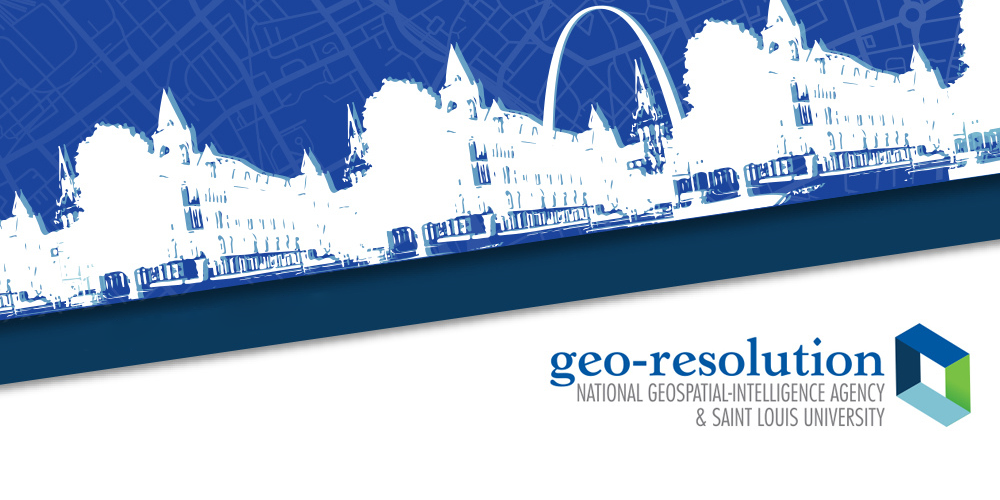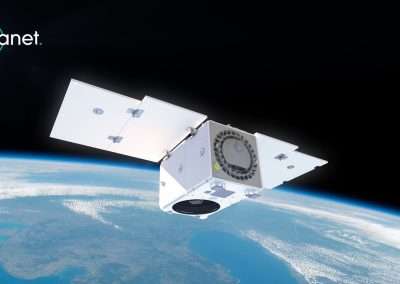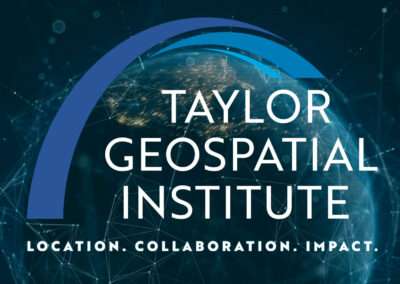ST. LOUIS – Registration is now open for Geo-Resolution 2024, the annual event that brings together the geospatial community in the St. Louis region and beyond. The day-long conference, which is cosponsored by the National Geospatial-Intelligence Agency and Saint Louis University and supported by the Taylor Geospatial Institute, will take place September 12 on the SLU campus. The theme of Geo-Resolution 2024 is, “Modeling the Future to Address Today’s Geospatial Challenges,” and the conference will include panel discussions on a variety of topics at the forefront of geospatial science and technology, a student mentoring lunch, student poster session, the TGI Expo, and more.
Geo-Resolution provides a venue for collaboration and discussion among geospatial experts and students in government, academia, and industry. This year’s gathering focuses on the development and application of geospatial models, such as digital twins, that can be used to address some of the world’s most critical challenges.
Geo-Resolution 2024 highlights the important role of geospatial models in addressing global issues and advancing geospatial science. Building on the theme of Geo-Resolution 2023, which centered on digital transformations and GeoAI, this year’s conference dives deeper into key areas for geospatial research and innovation, such as digital twins, gaming and simulation, big data, artificial intelligence, and more.
Speakers and attendees will also consider how new technologies and applications for geospatial modeling might impact the future of the geospatial workforce and the skills needed to make an impact in the geospatial field.
Geo-Resolution 2024 will consider:
- What are the strengths and weak spots of modeling in geospatial research and analysis? What are areas for growth and development over the next decade and beyond?
- How has the development of generative AI influenced the types and possibilities of modeling in the geospatial field?
- What are some of the specific global challenges that geospatial researchers have been addressing through modeling?
- What are the new technologies or techniques of geospatial modeling that will be critical skills for the future workforce?
Check out Geo-Resolution 2023
The National Geospatial-Intelligence Agency’s involvement in the 2024 Geo-Resolution Conference does not imply endorsement of SLU, TGI, or any SLU-TGI events by the United States Government.
About NGA
NGA delivers world-class geospatial intelligence that provides a decisive advantage to policymakers, warfighters, intelligence professionals and first responders.
NGA is a unique combination of intelligence agency and combat support agency. It is the world leader in timely, relevant, accurate and actionable geospatial intelligence. NGA enables the U.S. intelligence community and the Department of Defense to fulfill the president’s national security priorities to protect the nation.
For more information about NGA, visit us online at nga.mil, Instagram, LinkedIn, Facebook and X/Twitter.
About SLU
Founded in 1818, Saint Louis University is one of the nation’s oldest and most prestigious Catholic institutions. Rooted in Jesuit values and its pioneering history as the first university west of the Mississippi River, SLU offers more than 15,200 students a rigorous, transformative education of the whole person. At the core of the University’s diverse community of scholars is SLU’s service-focused mission, which challenges and prepares students to make the world a better, more just place.
About Taylor Geospatial Institute
TGI is passionate about fueling geospatial science and technology to create the next generation of solutions and policies that the whole world will depend on for sustainability and growth.
The TGI consortium includes Saint Louis University, the Donald Danforth Plant Science Center, Harris-Stowe State University, University of Illinois Urbana-Champaign, Missouri University of Science & Technology, University of Missouri-Columbia, University of Missouri-St. Louis, and Washington University in St. Louis. Collectively, these institutions cover geospatial research from ocean depths to outer space.
For more information, visit taylorgeospatial.org.




